First Draft - Momotaro
Momotaro, Peach Boy, is a classic Japanese folk tale.
桃太郎
楠山正雄
Momotaro
Masao Kusuyama
一
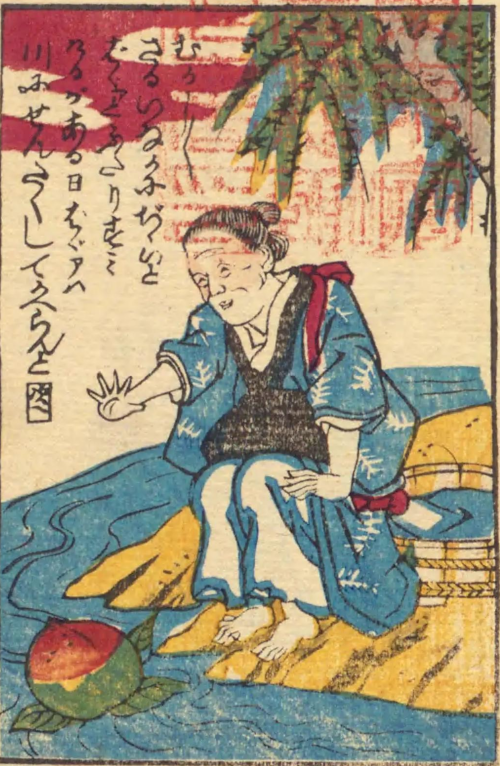
むかし、むかし、あるところに、おじいさんとおばあさんがありました。まいにち、おじいさんは山へしば刈《か》りに、おばあさんは川へ洗濯《せんたく》に行きました。
ある日、おばあさんが、川のそばで、せっせと洗濯《せんたく》をしていますと、川上《かわかみ》から、大きな桃《もも》が一つ、
「ドンブラコッコ、スッコッコ。ドンブラコッコ、スッコッコ。」
と流《なが》れて来《き》ました。
「おやおや、これはみごとな桃《もも》だこと。おじいさんへのおみやげに、どれどれ、うちへ持《も》って帰《かえ》りましょう。」
おばあさんは、そう言《い》いながら、腰《こし》をかがめて桃《もも》を取《と》ろうとしましたが、遠《とお》くって手がとどきません。おばあさんはそこで、
「あっちの水《みいず》は、かあらいぞ。
こっちの水《みいず》は、ああまいぞ。
かあらい水《みいず》は、よけて来《こ》い。
ああまい水《みいず》に、よって来《こ》い。
と歌《うた》いながら、手をたたきました。すると桃《もも》はまた、
といいながら、おばあさんの前《まえ》へ流《なが》れて来《き》ました。おばあさんはにこにこしながら、
「早《はや》くおじいさんと二人《ふたり》で分《わ》けて食《た》べましょう。」
と言《い》って、桃《もも》をひろい上《あ》げて、洗濯物《せんたくもの》といっしょにたらいの中に入《い》れて、えっちら、おっちら、かかえておうちへ帰《かえ》りました。
夕方《ゆうがた》になってやっと、おじいさんは山からしばを背負《せお》って帰《かえ》って来《き》ました。
「おばあさん、今《いま》帰《かえ》ったよ。」
「おや、おじいさん、おかいんなさい。待《ま》っていましたよ。さあ、早《はや》くお上《あ》がんなさい。いいものを上《あ》げますから。」
「それはありがたいな。何《なん》だね、そのいいものというのは。」
こういいながら、おじいさんはわらじをぬいで、上に上《あ》がりました。その間《ま》に、おばあさんは戸棚《とだな》の中からさっきの桃《もも》を重《おも》そうにかかえて来《き》て、
「ほら、ごらんなさいこの桃《もも》を。」
と言《い》いました。
「ほほう、これはこれは。どこからこんなみごとな桃《もも》を買《か》って来《き》た。」
「いいえ、買《か》って来《き》たのではありません。今日《きょう》川で拾《ひろ》って来《き》たのですよ。」
「え、なに、川で拾《ひろ》って来《き》た。それはいよいよめずらしい。」
こうおじいさんは言《い》いながら、桃《もも》を両手《りょうて》にのせて、ためつ、すがめつ、ながめていますと、だしぬけに、桃《もも》はぽんと中から二つに割《わ》れて、
「おぎゃあ、おぎゃあ。」
と勇《いさ》ましいうぶ声《こえ》を上《あ》げながら、かわいらしい赤《あか》さんが元気《げんき》よくとび出《だ》しました。
「おやおや、まあ。」
おじいさんも、おばあさんも、びっくりして、二人《ふたり》いっしょに声《こえ》を立《た》てました。
「まあまあ、わたしたちが、へいぜい、どうかして子供《こども》が一人《ひとり》ほしい、ほしいと言《い》っていたものだから、きっと神《かみ》さまがこの子をさずけて下《くだ》さったにちがいない。」
おじいさんも、おばあさんも、うれしがって、こう言《い》いました。
そこであわてておじいさんがお湯《ゆ》をわかすやら、おばあさんがむつきをそろえるやら、大《おお》さわぎをして、赤《あか》さんを抱《だ》き上《あ》げて、うぶ湯《ゆ》をつかわせました。するといきなり、
「うん。」
と言《い》いながら、赤《あか》さんは抱《だ》いているおばあさんの手をはねのけました。
「おやおや、何《なん》という元気《げんき》のいい子だろう。」
おじいさんとおばあさんは、こう言《い》って顔《かお》を見合《みあ》わせながら、「あッは、あッは。」とおもしろそうに笑《わら》いました。
そして桃《もも》の中から生《う》まれた子だというので、この子に桃太郎《ももたろう》という名《な》をつけました。

One
Long, long ago, an old man and his wife lived somewhere. Everyday, the old man went to the mountain to gather firewood. The old woman went to the river to wash clothes. One day while the old woman scrubbed and scrubbed the clothes, a huge peach came bobbing and splashing down from upstream.
"Oh, this is an amazing peach. I'll bring it home as a gift to my old hubby. My, oh my."
As she spoke, the old woman bent over to pick up the peach, but her hand couldn't reach it. She clapped her hands as she sang,
Then, the peach chanted, "Glub-glub-goo! Glub-glub-goo!" and flowed in front of the old woman. Smiling, she said, "Soon I'll cut this in half for two people and eat with the old man."
She picked up the peach and put it in the tub with the laundry. Huffing and puffing, she carried it home.
Evening came. The old man lugging a load of firewood returned home from the mountain.
"Honey, I'm home."
"Oh, good. I've been waiting for you. Hurry and come in. I have a wonderful surprise for you."
"Oh, thank you. What could it be?"
He took off his straw sandals and stepped inside. Meanwhile, his wife brought in a heavy-looking peach from the cupboard.
"Look at this peach," she said.
"Whoa, where did you buy that amazing peach?"
"I didn't buy it. I plucked it from the river today."
"What? You picked it out of the river. That is amazing," he said.
He took the peach in both hands and inspected it from every angle. Suddenly, the peach split in two from the inside.
"Oh my!" exclaimed the surprised old couple together.
"Everyday, we wished for a child. Now god has given us this baby," said the overjoyed couple.
Then, a ruckus broke out. The old man rush to heat up the bath water. The old woman prepared a child's obi, picked up the baby, and gave him his first ceremonial bath.
"Well, he's a healthy child."
The old man and the old woman said this and looked at each other's faces and laughed.
"Ah, ha, ha."
They named this child Momotaro, Peach Boy, because he's a child born from a peach.
二
おじいさんとおばあさんは、それはそれはだいじにして桃太郎《ももたろう》を育《そだ》てました。桃太郎《ももたろう》はだんだん成長《せいちょう》するにつれて、あたりまえの子供《こども》にくらべては、ずっと体《からだ》も大きいし、力《ちから》がばかに強《つよ》くって、すもうをとっても近所《きんじょ》の村《むら》じゅうで、かなうものは一人《ひとり》もないくらいでしたが、そのくせ気《き》だてはごくやさしくって、おじいさんとおばあさんによく孝行《こうこう》をしました。
桃太郎《ももたろう》は十五になりました。
もうそのじぶんには、日本《にほん》の国中《くにじゅう》で、桃太郎《ももたろう》ほど強《つよ》いものはないようになりました。桃太郎《ももたろう》はどこか外国《がいこく》へ出かけて、腕《うで》いっぱい、力《ちから》だめしをしてみたくなりました。
するとそのころ、ほうぼう外国《がいこく》の島々《しまじま》をめぐって帰《かえ》って来《き》た人があって、いろいろめずらしい、ふしぎなお話《はなし》をした末《すえ》に、
「もう何年《なんねん》も何年《なんねん》も船《ふね》をこいで行くと、遠《とお》い遠《とお》い海《うみ》のはてに、鬼《おに》が島《しま》という所《ところ》がある。悪《わる》い鬼《おに》どもが、いかめしいくろがねのお城《しろ》の中に住《す》んで、ほうぼうの国《くに》からかすめ取《と》った貴《とうと》い宝物《たからもの》を守《まも》っている。」
と言《い》いました。
桃太郎《ももたろう》はこの話《はなし》をきくと、その鬼《おに》が島《しま》へ行ってみたくって、もう居《い》ても立《た》ってもいられなくなりました。そこでうちへ帰《かえ》るとさっそく、おじいさんの前《まえ》へ出て、
「どうぞ、わたくしにしばらくおひまを下《くだ》さい。」
と言《い》いました。
おじいさんはびっくりして、
「お前《まえ》どこへ行くのだ。」
と聞《き》きました。
「鬼《おに》が島《しま》へ鬼《おに》せいばつに行こうと思《おも》います。」
と桃太郎《ももたろう》はこたえました。
「ほう、それはいさましいことだ。じゃあ行っておいで。」
とおじいさんは言《い》いました。
「まあ、そんな遠方《えんぽう》へ行くのでは、さぞおなかがおすきだろう。よしよし、おべんとうをこしらえて上《あ》げましょう。」
とおばあさんも言《い》いました。
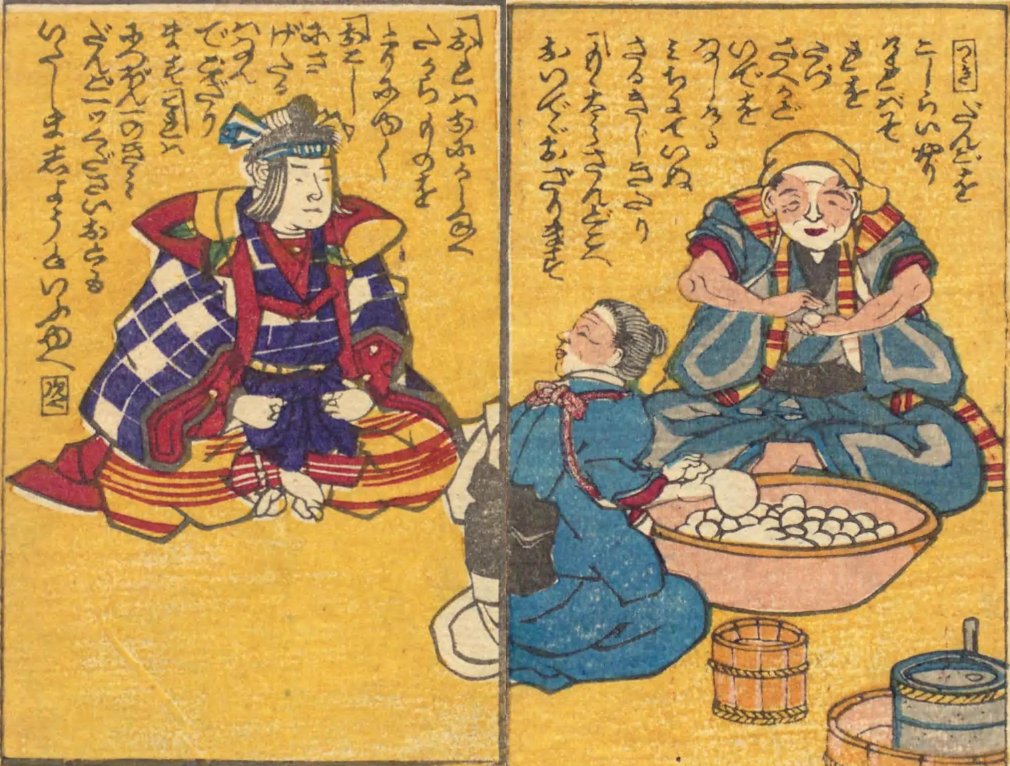
そこで、おじいさんとおばあさんは、お庭《にわ》のまん中に、えんやら、えんやら、大きな臼《うす》を持《も》ち出《だ》して、おじいさんがきねを取《と》ると、おばあさんはこねどりをして、
「ぺんたらこっこ、ぺんたらこっこ。ぺんたらこっこ、ぺんたらこっこ。」
と、おべんとうのきびだんごをつきはじめました。
きびだんごがうまそうにでき上《あ》がると、桃太郎《ももたろう》のしたくもすっかりでき上《あ》がりました。
桃太郎《ももたろう》はお侍《さむらい》の着《き》るような陣羽織《じんばおり》を着《き》て、刀《かたな》を腰《こし》にさして、きびだんごの袋《ふくろ》をぶら下《さ》げました。そして桃《もも》の絵《え》のかいてある軍扇《ぐんせん》を手に持《も》って、
「ではおとうさん、おかあさん、行ってまいります。」
と言《い》って、ていねいに頭《あたま》を下《さ》げました。
「じゃあ、りっぱに鬼《おに》を退治《たいじ》してくるがいい。」
とおじいさんは言《い》いました。
「気《き》をつけて、けがをしないようにおしよ。」
とおばあさんも言《い》いました。
「なに、大丈夫《だいじょうぶ》です、日本一《にっぽんいち》のきびだんごを持《も》っているから。」と桃太郎《ももたろう》は言《い》って、
「では、ごきげんよう。」
と元気《げんき》な声《こえ》をのこして、出《で》ていきました。おじいさんとおばあさんは、門《もん》の外《そと》に立《た》って、いつまでも、いつまでも見送《みおく》っていました。
Two
The couple raised Momotaro as the important child he was to them. As Momotaro grew up, he became much bigger and incredibly strong compared to other children. Even in a sumo match, not one person in the village was his rival. As a result, he had a gentle nature and was devoted to the old couple.
Momotaro turned fifteen.
He believed no one in all of Japan was stronger than he and wanted to go to some foreign country to test the limits of his strength
Around that time, people had traveled to the islands of foreign countries. One of the many unusual and mysterious tales told of rowing a boat for many years to the edge of a faraway sea to a place called Demon Island. Evil demons lived in a formidable iron castle and guarded precious treasures stolen from various lands.
When Momotaro heard this story, he wanted to go to Demon Island. He became restless and had to go. When he returned home, he immediately spoke to the old man.
"Please, let me go away for a short time."
The old man was surprised and asked, "Where are you going?"
Momotaro answered, "To Demon Island. I think I will attack and conquer the demons."
"Oh, that is courageous. Well, you may go."
The old woman said, "If you're going that far away, you will surely get hungry. I will prepare bento for you."
Then, the old man and woman lugged a large mortar into the garden. The old man picked up the mallet. The old woman kneaded.
Plop! Squish! Slap! Bang! Plop! Squish! Slap! Bang!
They pounded the millet to make dumplings for the bento.
The millet dumplings looked delicious. The preparations for Momotaro were finished.
Momotaro put on a battle surcoat worn by samurai, wore swords at his waist, and dangled the sack of millet dumplings. He held a war fan bearing a picture of a peach.
"Father, Mother, I'm ready to go now," said Momotaro, respectfully bowing his head.
"Now, go and defeat those demons," said the old man.
"Be careful. Don't get hurt," said the old woman.
Momotaro said, "Oh, I'll be fine because I have Japan's best millet dumplings."
"Well then, farewell."
He left with those happy words. The old man and the old woman stood outside the gate for a long, long time to see him off.
三
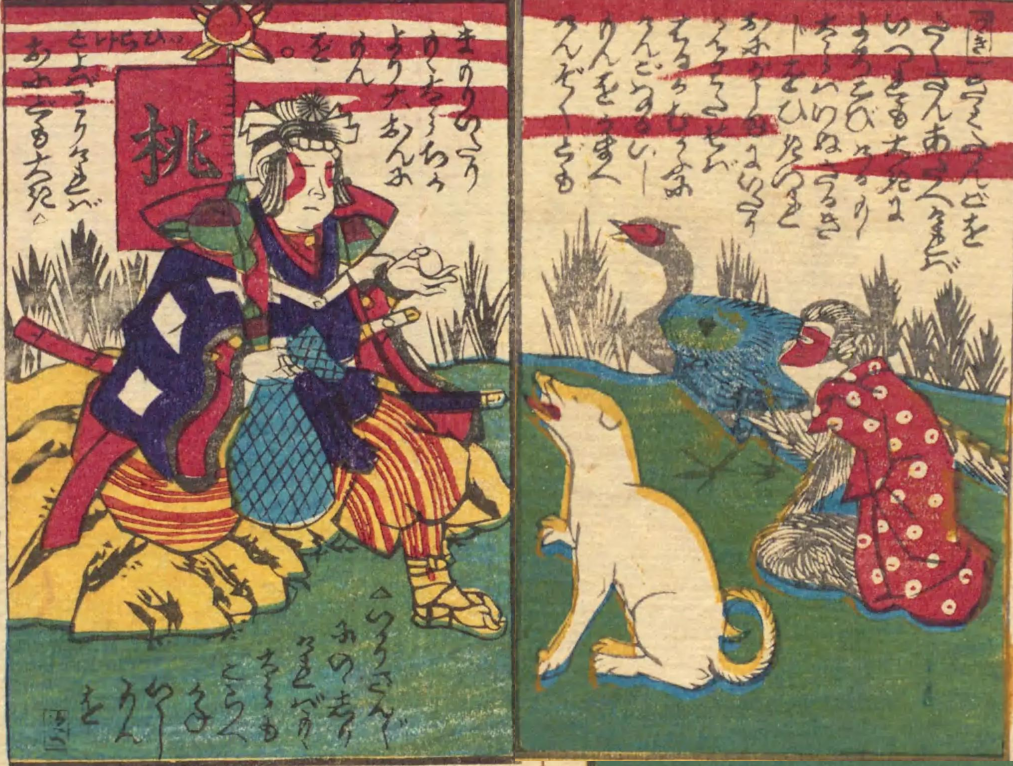
桃太郎《ももたろう》はずんずん行きますと、大きな山の上に来《き》ました。すると、草《くさ》むらの中から、「ワン、ワン。」と声《こえ》をかけながら、犬《いぬ》が一ぴきかけて来《き》ました。
桃太郎《ももたろう》がふり返《かえ》ると、犬《いぬ》はていねいに、おじぎをして、
「桃太郎《ももたろう》さん、桃太郎《ももたろう》さん、どちらへおいでになります。」
とたずねました。
「鬼《おに》が島《しま》へ、鬼《おに》せいばつに行くのだ。」
「お腰《こし》に下《さ》げたものは、何《なん》でございます。」
「日本《にっぽん》一のきびだんごさ。」
「一つ下《くだ》さい、お供《とも》しましょう。」
「よし、よし、やるから、ついて来《こ》い。」
犬《いぬ》はきびだんごを一つもらって、桃太郎《ももたろう》のあとから、ついて行きました。
山を下《お》りてしばらく行《い》くと、こんどは森《もり》の中にはいりました。すると木の上から、「キャッ、キャッ。」とさけびながら、猿《さる》が一ぴき、かけ下《お》りて来《き》ました。
桃太郎《ももたろう》がふり返《かえ》ると、猿《さる》はていねいに、おじぎをして、
「桃太郎《ももたろう》さん、桃太郎《ももたろう》さん、どちらへおいでになります。」
とたずねました。
「鬼《おに》が島《しま》へ鬼《おに》せいばつに行くのだ。」
「お腰《こし》に下《さ》げたものは、何《なん》でございます。」
「日本《にっぽん》一のきびだんごさ。」
「一つ下《くだ》さい、お供《とも》しましょう。」
「よし、よし、やるから、ついて来《こ》い。」
猿《さる》もきびだんごを一つもらって、あとからついて行きました。
山を下《お》りて、森《もり》をぬけて、こんどはひろい野原《のはら》へ出ました。すると空《そら》の上で、「ケン、ケン。」と鳴《な》く声《こえ》がして、きじが一|羽《わ》とんで来《き》ました。
桃太郎《ももたろう》がふり返《かえ》ると、きじはていねいに、おじぎをして、
「桃太郎《ももたろう》さん、桃太郎《ももたろう》さん、どちらへおいでになります。」
とたずねました。
「鬼《おに》が島《しま》へ鬼《おに》せいばつに行くのだ。」
「お腰《こし》に下《さ》げたものは、何《なん》でございます。」
「日本一《にっぽんいち》のきびだんごさ。」
「一つ下《くだ》さい、お供《とも》しましょう。」
「よし、よし、やるから、ついて来《こ》い。」
きじもきびだんごを一つもらって、桃太郎《ももたろう》のあとからついて行きました。
犬《いぬ》と、猿《さる》と、きじと、これで三にんまで、いい家来《けらい》ができたので、桃太郎《ももたろう》はいよいよ勇《いさ》み立《た》って、またずんずん進《すす》んで行きますと、やがてひろい海《うみ》ばたに出ました。
そこには、ちょうどいいぐあいに、船《ふね》が一そうつないでありました。
桃太郎《ももたろう》と、三にんの家来《けらい》は、さっそく、この船《ふね》に乗《の》り込《こ》みました。
「わたくしは、漕《こ》ぎ手《て》になりましょう。」
こう言《い》って、犬《いぬ》は船《ふね》をこぎ出《だ》しました。
「わたくしは、かじ取《と》りになりましょう。」
こう言《い》って、猿《さる》がかじに座《すわ》りました。
「わたくしは物見《ものみ》をつとめましょう。」
こう言《い》って、きじがへさきに立《た》ちました。
うららかないいお天気《てんき》で、まっ青《さお》な海《うみ》の上には、波《なみ》一つ立《た》ちませんでした。稲妻《いなづま》が走《はし》るようだといおうか、矢《や》を射《い》るようだといおうか、目のまわるような速《はや》さで船《ふね》は走って行きました。ほんの一|時間《じかん》も走《はし》ったと思《おも》うころ、へさきに立《た》って向《む》こうをながめていたきじが、「あれ、あれ、島《しま》が。」とさけびながら、ぱたぱたと高《たか》い羽音《はおと》をさせて、空《そら》にとび上《あ》がったと思《おも》うと、スウッとまっすぐに風《かぜ》を切《き》って、飛《と》んでいきました。
桃太郎《ももたろう》もすぐきじの立《た》ったあとから向《む》こうを見《み》ますと、なるほど、遠《とお》い遠《とお》い海《うみ》のはてに、ぼんやり雲《くも》のような薄《うす》ぐろいものが見《み》えました。船《ふね》の進《すす》むにしたがって、雲《くも》のように見《み》えていたものが、だんだんはっきりと島《しま》の形《かたち》になって、あらわれてきました。
「ああ、見《み》える、見《み》える、鬼《おに》が島《しま》が見《み》える。」
桃太郎《ももたろう》がこういうと、犬《いぬ》も、猿《さる》も、声《こえ》をそろえて、「万歳《ばんざい》、万歳《ばんざい》。」とさけびました。
見《み》る見《み》る鬼《おに》が島《しま》が近《ちか》くなって、もう硬《かた》い岩《いわ》で畳《たた》んだ鬼《おに》のお城《しろ》が見《み》えました。いかめしいくろがねの門《もん》の前《まえ》に見《み》はりをしている鬼《おに》の兵隊《へいたい》のすがたも見《み》えました。
そのお城《しろ》のいちばん高《たか》い屋根《やね》の上に、きじがとまって、こちらを見《み》ていました。
こうして何年《なんねん》も、何年《なんねん》もこいで行《い》かなければならないという鬼《おに》が島《しま》へ、ほんの目をつぶっている間《ま》に来《き》たのです。
Three
Momotaro marched off and eventually reached the top of a huge mountain.
"Woof! Woof! Woof!" emerged from a thicket of grass followed by a dog.
When Momotaro turned around, the dog respectfully bowed.
He asked, "Momotaro-san, Momotaro-san, where are you going?"
"I'm going to Demon Island to conquer the demons."
"What is that hanging from your waist?"
"Japan's best millet dumplings."
"Please, give me one and I will accompany you."
"Good. Good. I'll give you one. Now, come with me."
The dog took the millet dumpling and followed Momotaro.
Soon after they went down the mountain, they entered a forest.
The cry "Kya! Kya!" came from the top of the trees. A monkey came scrambling down.
When Momotaro turned around, the monkey politely bowed and asked, "Momotaro-san, Momotaro-san, where are you going?"
"I'm going to Demon Island to conquer the demons."
"What is that hanging from your waist?"
"Japan's best millet dumplings."
"Please, give me one and I will accompany you."
"Good. Good. I'll give you one. Now, come with us."
The monkey took the millet dumpling and followed Momotaro.
They went down a mountain, passed through the forest, and next, came out at a sweeping meadow. Up in the sky, the cry "Kee! Kee!" came from a pheasant heading toward them.
When Momotaro turned around, the pheasant politely bowed and asked, "Momotaro-san, Momotaro-san, where are you going?"
"I'm going to Demon Island to conquer the demons."
"What is that hanging from your waist?"
"Japan's best millet dumplings."
"Please, give me one and I will accompany you."
"Good. Good. I'll give you one. Now, come with us."
The pheasant took the millet dumpling and followed Momotaro.
Now, he had three vassals, a dog, a monkey, and a pheasant. Finally, Momotaro bravely stood, marched off, and came to the edge of the ocean.
The situation was perfect. A boat was moored there.
"I'll be the rower," said the dog and started rowing the boat.
"I'll steer the boat," said the monkey and sat at the helm.
"I'll be the lookout," said the pheasant and stood at the bow of the ship.
On the bright, sunny day, not one wave was on the deep blue ocean. The boat ran at a dizzying speed like a flash of lightning or an arrow shot from a bow. When, perhaps, an hour passed, the pheasant, standing at the bow staring far ahead, shouted, "Over there. There's an island over there," he loudly flapped his wings. When he thought he would fly up into the sky, he flew, cutting straight through the wind.
Momotaro looked straight past where the pheasant had been standing. Of course, on the edge of the ocean far, far away, he could see a thin object like a hazy cloud. As the boat moved forward, the thing that looked like a cloud gradually took on the distinct shape of an island.
"Oh, I can see it. I see it. I can see Demon Island," said Momotaro.
In unison, the dog and the monkey shouted, "Banzai! Banzai!"
Before their eyes, Demon Island got closer. They could see the demons' castle folded like a hardened stone. In front of the imposing steel gate, they could see the shapes of demon warriors on guard.
The pheasant stopped on the highest roof of the castle and watched.
In the blink of an eye, they arrived at Demon Island after many years of rowing.
四
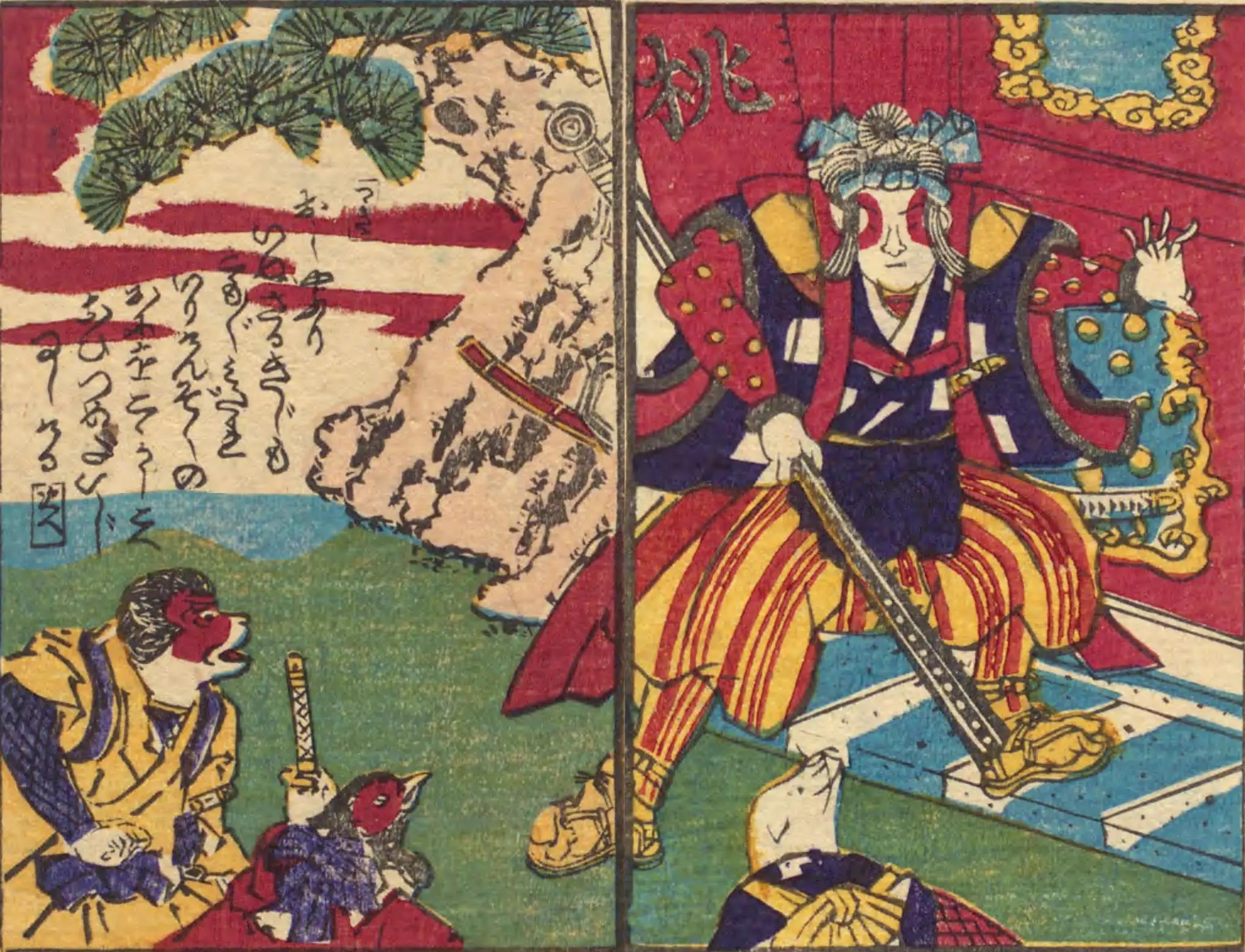
桃太郎《ももたろう》は、犬《いぬ》と猿《さる》をしたがえて、船《ふね》からひらりと陸《おか》の上にとび上《あ》がりました。
見《み》はりをしていた鬼《おに》の兵隊《へいたい》は、その見《み》なれないすがたを見《み》ると、びっくりして、あわてて門《もん》の中に逃《に》げ込《こ》んで、くろがねの門《もん》を固《かた》くしめてしまいました。その時《とき》犬《いぬ》は門《もん》の前《まえ》に立《た》って、
「日本《にほん》の桃太郎《ももたろう》さんが、お前《まえ》たちをせいばいにおいでになったのだぞ。あけろ、あけろ。」
とどなりながら、ドン、ドン、扉《とびら》をたたきました。鬼《おに》はその声《こえ》を聞《き》くと、ふるえ上《あ》がって、よけい一生懸命《いっしょうけんめい》に、中から押《お》さえていました。
するときじが屋根《やね》の上からとび下《お》りてきて、門《もん》を押《お》さえている鬼《おに》どもの目をつつきまわりましたから、鬼《おに》はへいこうして逃《に》げ出《だ》しました。その間《ま》に、猿《さる》がするすると高《たか》い岩壁《いわかべ》をよじ登《のぼ》っていって、ぞうさなく門《もん》を中からあけました。
「わあッ。」とときの声《こえ》を上《あ》げて、桃太郎《ももたろう》の主従《しゅじゅう》が、いさましくお城《しろ》の中に攻《せ》め込《こ》んでいきますと、鬼《おに》の大将《たいしょう》も大《おお》ぜいの家来《けらい》を引《ひ》き連《つ》れて、一人一人《ひとりひとり》、太《ふと》い鉄《てつ》の棒《ぼう》をふりまわしながら、「おう、おう。」とさけんで、向《む》かってきました。
けれども、体《からだ》が大きいばっかりで、いくじのない鬼《おに》どもは、さんざんきじに目をつつかれた上に、こんどは犬《いぬ》に向《む》こうずねをくいつかれたといっては、痛《いた》い、痛《いた》いと逃《に》げまわり、猿《さる》に顔《かお》を引《ひ》っかかれたといっては、おいおい泣《な》き出《だ》して、鉄《てつ》の棒《ぼう》も何《なに》もほうり出《だ》して、降参《こうさん》してしまいました。
おしまいまでがまんして、たたかっていた鬼《おに》の大将《たいしょう》も、とうとう桃太郎《ももたろう》に組《く》みふせられてしまいました。桃太郎《ももたろう》は大きな鬼《おに》の背中《せなか》に、馬乗《うまの》りにまたがって、
「どうだ、これでも降参《こうさん》しないか。」
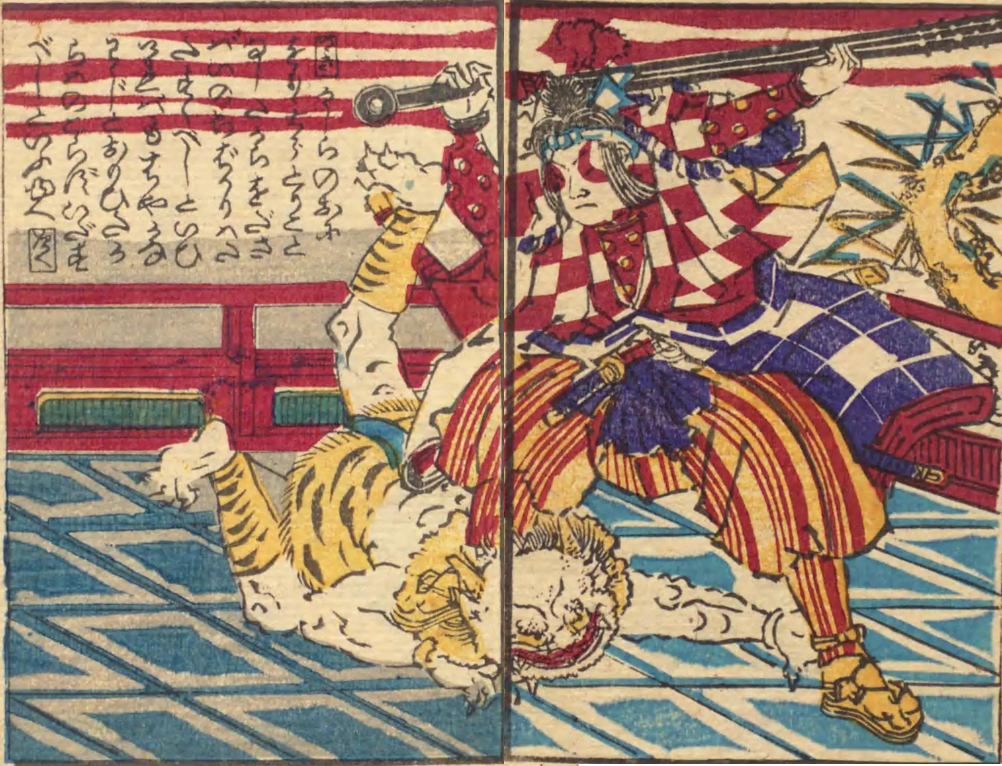
といって、ぎゅうぎゅう、ぎゅうぎゅう、押《お》さえつけました。
鬼《おに》の大将《たいしょう》は、桃太郎《ももたろう》の大力《だいりき》で首《くび》をしめられて、もう苦《くる》しくってたまりませんから、大《おお》つぶの涙《なみだ》をぼろぼろこぼしながら、
「降参《こうさん》します、降参《こうさん》します。命《いのち》だけはお助《たす》け下《くだ》さい。その代《か》わりに宝物《たからもの》をのこらずさし上《あ》げます。」
こう言《い》って、ゆるしてもらいました。
鬼《おに》の大将《たいしょう》は約束《やくそく》のとおり、お城《しろ》から、かくれみのに、かくれ笠《がさ》、うちでの小《こ》づちに如意宝珠《にょいほうじゅ》、そのほかさんごだの、たいまいだの、るりだの、世界《せかい》でいちばん貴《とうと》い宝物《たからもの》を山のように車《くるま》に積《つ》んで出《だ》しました。
桃太郎《ももたろう》はたくさんの宝物《たからもの》をのこらず積《つ》んで、三にんの家来《けらい》といっしょに、また船《ふね》に乗《の》りました。帰《かえ》りは行きよりもまた一そう船《ふね》の走《はし》るのが速《はや》くって、間《ま》もなく日本《にほん》の国《くに》に着《つ》きました。
船《ふね》が陸《おか》に着《つ》きますと、宝物《たからもの》をいっぱい積《つ》んだ車《くるま》を、犬《いぬ》が先《さき》に立《た》って引《ひ》き出《だ》しました。きじが綱《つな》を引《ひ》いて、猿《さる》があとを押《お》しました。
「えんやらさ、えんやらさ。」
三にんは重《おも》そうに、かけ声《ごえ》をかけかけ進《すす》んでいきました。
うちではおじいさんと、おばあさんが、かわるがわる、
「もう桃太郎《ももたろう》が帰《かえ》りそうなものだが。」
と言《い》い言《い》い、首《くび》をのばして待《ま》っていました。そこへ桃太郎《ももたろう》が三にんのりっぱな家来《けらい》に、ぶんどりの宝物《たからもの》を引《ひ》かせて、さもとくいらしい様子《ようす》をして帰《かえ》って来《き》ましたので、おじいさんもおばあさんも、目も鼻《はな》もなくして喜《よろこ》びました。
「えらいぞ、えらいぞ、それこそ日本一《にっぽんいち》だ。」
とおじいさんは言《い》いました。
「まあ、まあ、けががなくって、何《なに》よりさ。」
とおばあさんは言《い》いました。
桃太郎《ももたろう》は、その時《とき》犬《いぬ》と猿《さる》ときじの方《ほう》を向《む》いてこう言《い》いました。
「どうだ。鬼《おに》せいばつはおもしろかったなあ。」
犬《いぬ》はワン、ワンとうれしそうにほえながら、前足《まえあし》で立《た》ちました。
猿《さる》はキャッ、キャッと笑《わら》いながら、白《しろ》い歯《は》をむき出《だ》しました。
きじはケン、ケンと鳴《な》きながら、くるくると宙返《ちゅうがえ》りをしました。
空《そら》は青々《あおあお》と晴《は》れ上《あ》がって、お庭《にわ》には桜《さくら》の花《はな》が咲《さ》き乱《みだ》れていました。

Four
Momotaro, followed by the dog and the monkey, nimbly leaped onto a hill from the boat.
The staring demon warriors saw them and were surprised. In an uproar, they fled inside the iron gate and locked it. Then, the dog stood in front of the gate.
He pounded on the door while shouting, "Momotaro-san from Japan has come to conquer you. Open the gate!"
The demons shuddered at the sound of his voice and pushed from the inside with all their might.
The pheasant flew down from the roof and poked at the eyes of the demons pushing the gate. The demons were harassed and fled. Meanwhile, the monkey nimbly scrambled up the tall rock wall and, with ease, opened the gate from the inside.
"Whaaa!" cried out a voice. Momotaro, the master, and his vassals bravely invaded the castle. The demon general there was in command of many vassals. While each one was swinging a thick, iron pole, he came toward them, shouting, "Argh! Argh!"
However, only their bodies were big. After the eyes of the weak-minded demons were poked, the dog sunk its teeth into their shins. Screaming in pain, the demons fled. The ones whose faces had been scratched by the monkey were crying. Others threw down their iron rods and surrendered.
The demon general, who persevered and fought until the end, was finally pinned down by Momotaro. Momotaro straddled the back of the giant demon.
"Well, will you surrender?" Momotaro said while pressing down hard.
The demon general's neck was closed by Momotaro's great power. The pain became unbearable. While huge tears poured down, he said, "I surrender. I surrender. Please, spare my life. In exchange, I'll give you all the treasure."
As he promised, the demon general piled the most precious treasures from the castle, including invisibility cloaks, magic hats, small magic mallets, coral, mother-of-pearl, lapis lazuli, high like a mountain onto a cart.
Momotaro stacked the many treasures high. Together with his three vassals, he boarded the boat. Like the trip here, the boat ran swiftly on the way home and soon arrived in Japan.
When the boat landed on the shore, the cart filled with treasure was pulled out with the dog in the lead. The pheasant pulled a rope. The monkey pushed from behind.
"Heave-ho!"
At home, the old man and the old woman took turns speaking.
"Momotaro is back already."
They stretched their necks and waited. Momotaro had his three fine retainers pull the captured treasure and proudly had returned home. Both the old man and the old woman delighted in the total defeat.
The old man said, "Well done! You are the best in Japan."
The old woman said, "Oh, it's wonderful. You're not injured."
Momotaro said to the dog, monkey, and pheasant, "What do you think? Defeating the demons was fun."
The dog happily barked and stood on its front legs.
The monkey squealed as he smiled, baring his white teeth.
The pheasant screeched as it somersaulted through the air.
The sky cleared up to bright blue. Cherry blossoms wildly bloomed in the garden.
終わり
The End
- 桃太郎
- 著者名: 楠山正雄
- 入力:鈴木厚司
- 校正:大久保ゆう
- 翻訳者:シェリー・マーシャル
- 原文: 青空文庫, https://www.aozora.gr.jp/cards/000329/files/18376_12100.html (Accessed October 16, 2025)
- 絵: 村井静馬 著『[お伽噺]』桃太郎噺,小森宗次郎,明9.10. 国立国会図書館デジタルコレクション https://dl.ndl.go.jp/pid/1919646 (参照 2025-10-20)
- Momotaro (in Japanese)
- Author: Kusuyama Masao
- Input by: Suzuki Atsushi
- Revised by:Okubo Yu
- Translated by: Shelley Marshall
- Japanese text from: Aozora Bunko, https://www.aozora.gr.jp/cards/000329/files/18376_12100.html (Accessed October 16, 2025)
- Pictures from: Murai, Shizuma. Otogibanashi: Momotarō-banashi. Komori Sōjirō, 1876. National Diet Library Digital Collections https://dl.ndl.go.jp/pid/1919646 (Accessed October 20, 2025)